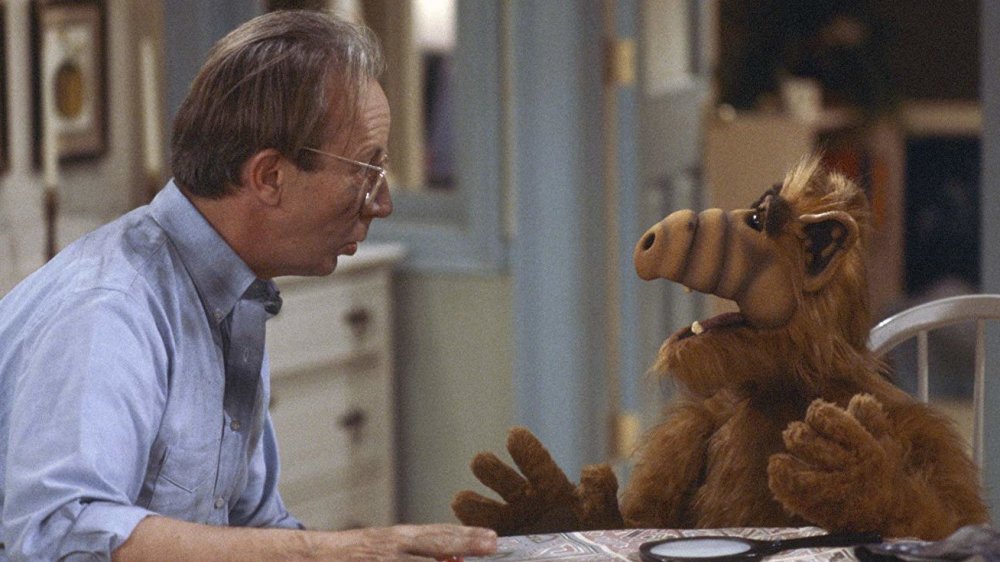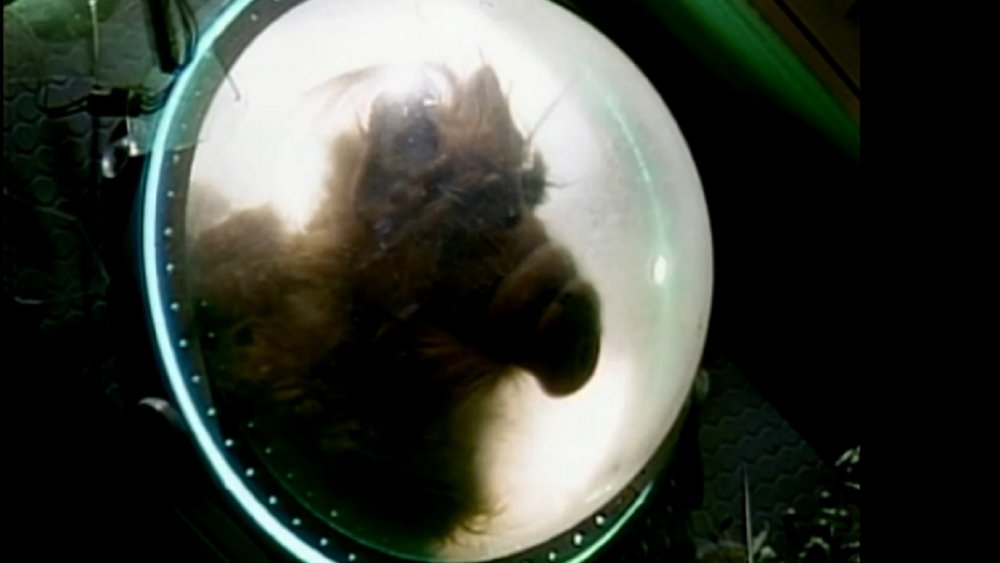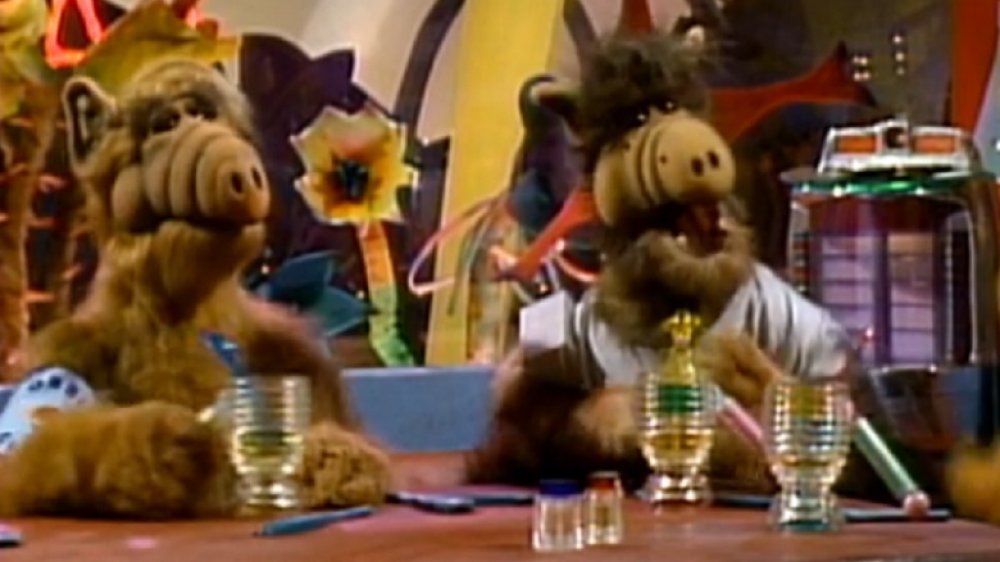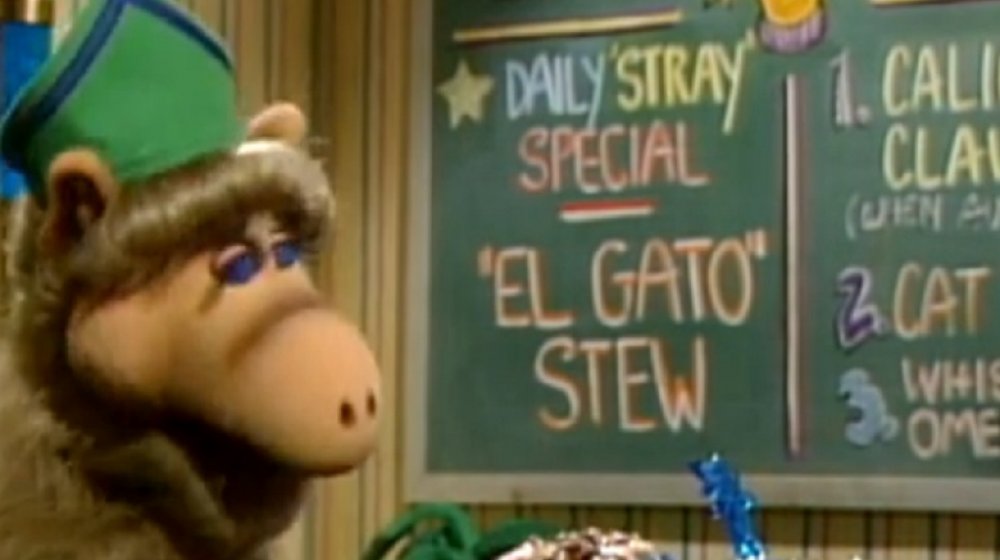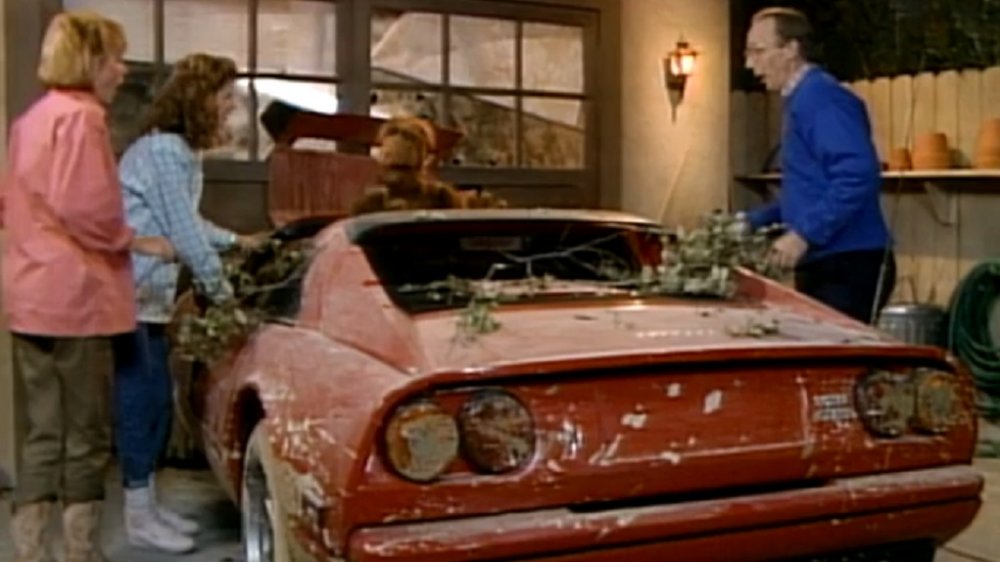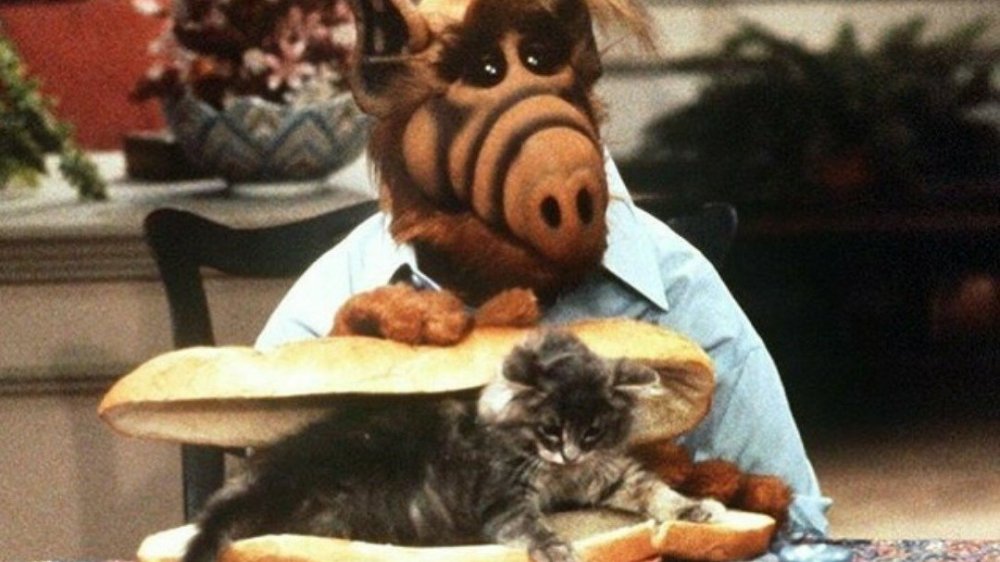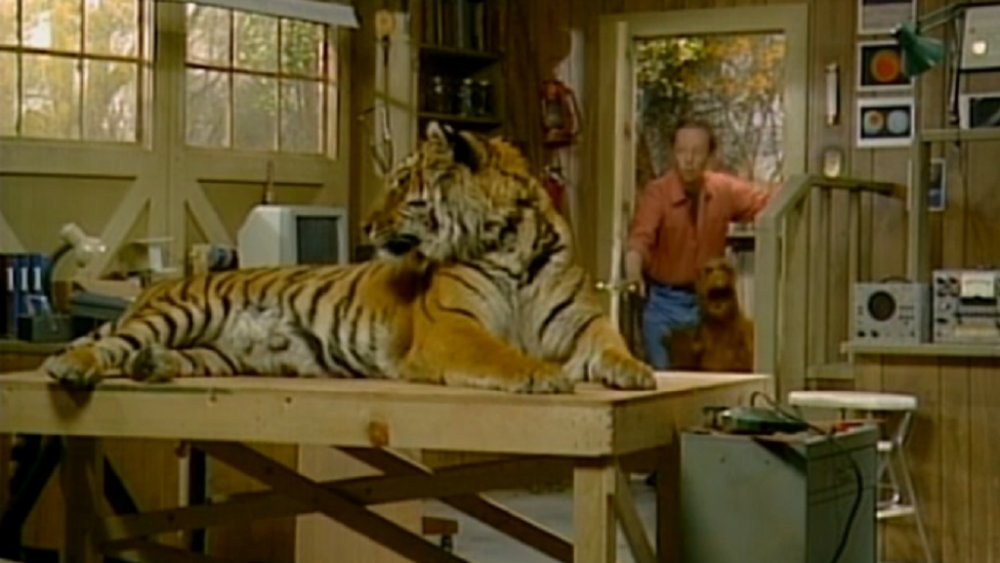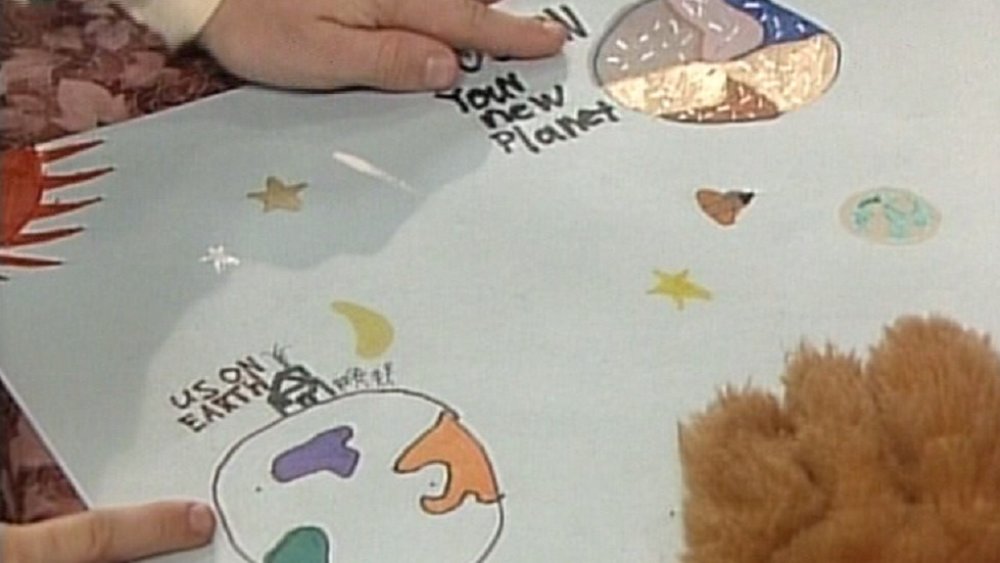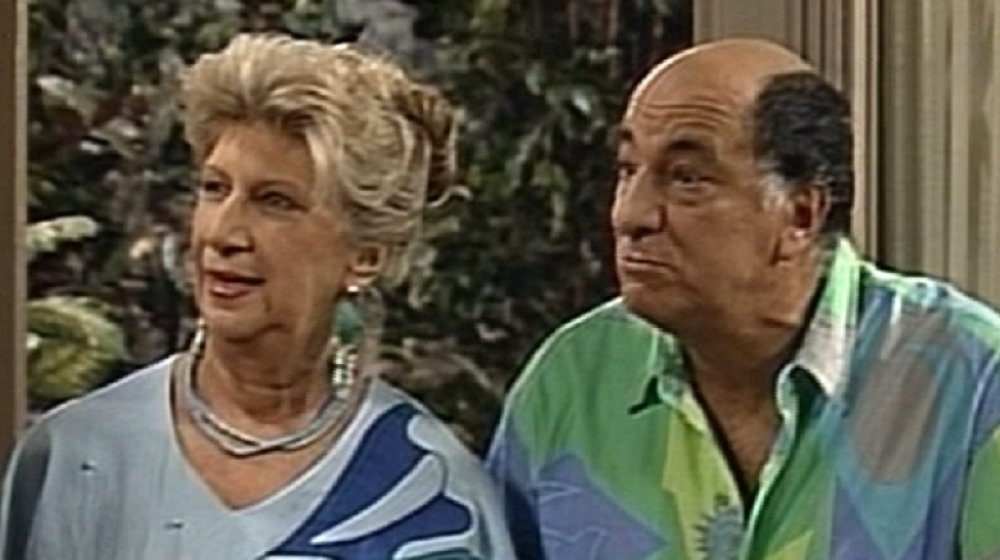Things Only Adults Notice In ALF
The airwaves were filled with strange films and television shows in the '80s, and ALF stands out as one of the more bizarre sitcoms from that era. It centers around the antics of an "Alien Life Form" living with an American family after crash landing into their garage. A fuzzy creature resembling a cross between an anteater and an aardvark, ALF had a smart mouth and troublemaking nature. The show was a hit, running for four seasons from 1986-1990 and generating spinoff comics and a TV movie. ALF even released musical recordings and made guest appearances on other shows.
Choosing an extraterrestrial as the protagonist isn't what makes ALF unique. Thanks in part to paranoia fueled by the Cold War, America was fixated on aliens, UFOs, and paranormal activity as much as big hair, leg warmers, and David Hasselhoff; as a result, numerous shows and movies featured non-human characters, including Mork and Mindy, Aliens, and The Thing. What makes ALF unique, however, is the sheer depth of depravity and darkness layered into a supposedly family-friendly show about an intergalactic wisenheimer. When rewatching it as an adult, you'll notice all kinds of questionable moments. From ALF's twisted sarcasm and abusive behavior to major conflicts with physics and the speed of light, from sketchy neighbors to flower child parents, here are the things only adults notice in ALF.
ALF is able to travel all the way from the Andromeda galaxy to Earth
ALF came to Earth after narrowly escaping the nuclear destruction of his home planet, Melmac. According to the show, Melmac is located in the Andromeda galaxy, which is about 2.5 million lightyears away.
Per our understanding of physics, it would take billions of years to travel that distance, and yet ALF was "only" 285 years old in the pilot episode. This means his home planet must have figured out how to travel faster than the speed of light. Even just learning how to travel the same speed as lightwaves would be a massive achievement, not to mention surpassing that speed.
And yet this topic is never discussed on the show. The Tanners must not be very inquisitive, because most adults would have countless questions about Melmacian technology. Learning about it could have great benefits for mankind, and would be fascinating besides. Had ALF crashed into a more science-minded home, the show would have looked a lot more like Cosmos.
Melmac and Earth share an uncanny number of similarities
Considering the immense distance between Earth and ALF's home planet, one would assume these two planets and their civilizations would have very little in common. Yet the similarities between Melmac and Earth vastly outweigh their differences.
The word "Melmac" itself is of terrestrial origin, and refers to a brand of dinnerware popular from the 1940s to the 1970s. ALF'S home planet is also supposedly made of Melmac, which opens up a whole series of other questions.
Additionally, both Melmac and Earth share a 12-month calendar (albeit with different names for the months), and ALF comes to Earth as an avid musician who has mastered multiple man-made instruments, including the piano (although he claims Melmacian pianos also have "red" keys).
Both planets have near-identical games of baseball, although it's known as Bouillabaseball on Melmac, and played with fish parts instead of balls. Even the flora and fauna are similar, such as when ALF substitutes ragweed for a native Melmacian plant known as Carl Shrub while suffering from hay fever on Earth.
Melmacians somehow had access to Western culture
In addition to sharing many unnerving similarities, Melmac also has qualities identical to those found on Earth. These are easy to disregard as kids, but are wildly confusing to the discerning adult mind.
For example, when ALF crash-lands his ship, he already speaks English (and Spanish) without any hint of an accent. Melmacians share numerous cultural concepts with their Earthly counterparts, including the exact same concepts of high school and college education systems. Even some of the lifeforms are identical, including cats, slugs, and aloe vera.
How could this possibly happen? This is especially confusing considering the distance between these two planets. It's possible Melmacians eventually received radio and TV waves... but that would be millions of years after they aired. How does that work? Does that mean Melmac is in the future, and ALF travels back in time to the past when he goes to Earth? It's enough to make one's brain hurt.
Being a kid is so much simpler.
The Tanner Family would be better off without ALF
ALF is supposed to be a friendly wisecracker, but his remarks are often sarcastic to the point of cynicism. In addition to his crass behavior, ALF has a tendency to destroy everything in his path with little regard for the consequences.
As a result, he starts causing strife for the Tanner family as soon as he crashes into their garage. During his time with the Tanners, he gets Willie arrested, crashes Lynn's car, and sets more than 240 fires, along with other extensive property damage. He even accrued thousands of dollars of gambling and credit card debt in their name.
ALF cost the Tanners so much money that it prevented Lynn from going to her college of choice. You'd think he'd have more respect for the people providing him with unconditional support, shelter, and food. They ask nothing of ALF, other than to not eat their cat — and he can't even follow through on that.
Also, the Tanners couldn't risk having anyone over out of fear of ALF being discovered, which is very isolating for them. The Tanners should have just let the Alien Task Force take him and be done with it. Had they done so, they would have saved themselves a lot of money, energy, heartache, and pet cats.
The dark legacy of Lucky the Cat
The Tanner family would have been far better off without ALF in their lives. His careless behavior also cost the Tanners their pet cat, Lucky.
Lucky's days were numbered the moment ALF moved in. Melmacians consider cats a delicacy, and they also experience frenzies of uncontrollable feeding. It was only a matter of time before ALF lost control and no one was there to stop him — and that time finally came in season 4, episode 9, "Live and Let Die."
Not only does ALF eat their beloved fur-baby, he attempts to eat even more cats by looking up free kitty ads in the local paper, and having them dropped off in the Tanners' garage. Thankfully, the Tanners intervene and stop the carnage, returning all but one cat back to their owners.
They kept one to become their new pet, of course. And they also let ALF stay, of course. Because that's totally what people do if you eat their cat, rather than have you arrested, or at the very least, kick your cat-eating butt out onto the street.
Who writes stuff like this?
ALF manages to get a tiger in the garage
Before the demise of the ironically named Lucky the Cat, he had several close calls with his equally furry, but not nearly as cute, alien roommate. One of the more memorable of those times was when Lucky went missing during an incident that took place in season 1, episode 19, "Wild Thing."
Every 75 years, Malmecians undergo a wild transformation lasting 24 hours that greatly amplifies their feeding instincts, to the point they're virtually unstoppable. ALF even has the Tanners build a cage for him and lock him in, but to no avail — he breaks loose and they lose track of him for hours. They're able to eventually lure ALF back home using telepathy and a fork (really), and he eventually returns to normal after the transformation passes.
Thankfully, he has no recollection of eating any cats, but does think he may have left something in the garage... which turns out to be a tiger missing from the local zoo. The episode ends with Willie Tanner saying, he'll do something about it, "just not immediately."
The adult mind is left with so many questions — starting with, how did he get the tiger out of the zoo and into the garage without getting mauled? How did the Tanners not hear anything? And what kind of sedatives is Willie on that make him so relaxed about having a giant killer cat in his garage?
ALF-aholics Anonymous
It's commonly assumed that ALF is a family show at heart, because it was such a huge hit with kids when it launched. However, the darker patina overlying the whole thing gives it a much more mature feel than mere kid fodder.
This is most easily identified in the evolution of some of ALF's traits, specifically his drinking habit. ALF can be seen drinking beer and becoming intoxicated as early as the first episode. However, his devil-may-care attitude towards the parental figures on the show endeared him to kids, along with his furry puppet appearance.
ALF's popularity with younger viewers caused the show to take a more kid-friendly direction, featuring less booze as the episodes rolled on. The last time alcohol is prominently featured on the show comes during season 2, episode 24, in the aptly named "Tequila." ALF gets so intoxicated he vomits while hung over — but it's all for a good cause, because ALF gets an important conversation about alcoholism going for a character in dire need of an intervention. Call it a very special kind of "very special episode."
Shortwave radio signals are hard to receive in deep space
Willie Tanner is a shortwave radio enthusiast, and it's this unusual hobby that lures a lost ALF to his doorstep (or, to be more accurate, through his garage roof). In reality, it's highly unlikely that shortwave radio waves would be strong enough to get that far into deep space.
Research shows that the length such a signal can travel all depends upon the type of shortwave radio being used to both send and receive it. Regardless, ALF probably wouldn't have been able to pick up such signals much beyond our immediate solar system. This isn't nearly far enough to locate while lost as far out as the Andromeda galaxy.
All science aside, the same radio waves that drew ALF to the Tanners would ultimately tear them apart. In the final episode, "Consider Me Gone," ALF receives an urgent incoming message over Willie's shortwave radio. Turns out his girlfriend Rhonda and best friend Skip bought a new planet, and want ALF to come back and help them "make a new Melmac."
"Make a new Melmac..."
During those fateful moments when Skip and Rhonda beg ALF to return to them so they can "make a new Melmac," we know we're supposed to be devastated over the loss of this lovable, unique creature and the ultimate end of the show. However, older watchers are more likely left wondering what was implied by "make a new Melmac."
Are we talking about some sort of a cloning situation here? Or are we talking good old-fashioned, physical procreation? And if we are indeed talking about that, what role does ALF's "best friend" Skip play? Is he involved in some way — maybe one that's more than meets the eye? Perhaps, Skip, ALF, and Rhonda are actually an alien throuple, or some other sort of alternative arrangement? Maybe the Melmacian race requires three at a time to successfully procreate?
No judgment here. But whatever the true nature of the situation turned out to be, it's still funny to imagine ALF getting booty calls all the way from deep space.
The Alien Task Force
ALF lives in perpetual fear of the Alien Task Force — a US military organization on a mission to track down extraterrestrials. He claims they "hunt down innocent aliens and do bad, bad things to them."
As kids, the audience feared these bad guys right alongside poor ALF. However, adulting begs one to ask: If the Alien Task Force (or ATF for short) is so powerful, why did it take them until the end of the final episode to capture ALF? According to the show, this task force had nearby Edwards Air Force base at its disposal. They knew where ALF was, and could have easily gotten to him before then.
Instead, he stayed in the same low-security house for four years. During that time, he was never discovered, and despite some people besides the Tanners learning about ALF's alien origins, and all the strange phenomena surrounding ALF's existence — in all that time, the US military couldn't figure out where he was? The Alien Task Force could have easily gotten to ALF while the Tanners were out, or even if they were home.
All in all, these guys don't seem like they're very good at their job.
The Sketchy Ochmenoks
Many characters on ALF have strange quirks, habits, and histories. Some that stand out more to the adult eye are the Tanners' next door neighbors, the Ochmenoks.
They are always eager to have little Jake come over for a sleepover, but the Tanner family holds off in an effort to keep word of ALF from spreading to the dreaded Alien Task Force. When one learns more details about this family, this decision seems extra prudent. Throughout the course of the show, the audience learns that Jake's father and cousin are both incarcerated, apparently throughout the four seasons the show aired. What could those immediate family members have done to warrant serving such serious time?
To top it off, Jake's mother is still around, but living in New York for some unknown reason. Why isn't she with her son? This poor kid! Maybe he does deserve sleepovers at nice people's houses after all. Sounds like he's had it rough and deserves a fair shot at life.
Willie and Kate Tanner were Flower children in the 60's
Speaking of strange character traits, during the course of the show it's also unveiled that the parental figures of the Tanner family have a very colorful past. Apparently, Willie was known as "Boxcar Willie" in his teens, due to his habit of train-hopping across the country.
This carefree behavior extended into his young adult life, when Willie became a flower child of the 1960s. Kate was also a hippie of that era, and the young couple spent the summer of 1967 honeymooning in Niagara Falls. That seems very sweet and vaguely romantic, until the adult mind realizes that year was in the era of the Summer of Love. Thousands of people converged on the area surrounding the Haight-Ashbury neighborhood of San Francisco.
Boxcar Willie and Flower Power Kate would have more likely been there, not the other coast. Niagara would make sense if they were out that way for Woodstock, but that wasn't until 1969. It doesn't make any sense. But what does make sense is LSD — watching ALF is like watching a twisted, long, dark, acid trip. One that starts with the crash from space as the "drop," and getting caught by the Alien Task Force as the comedown.
